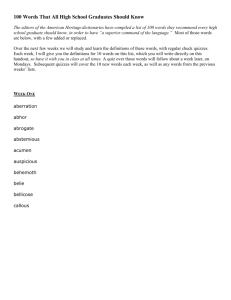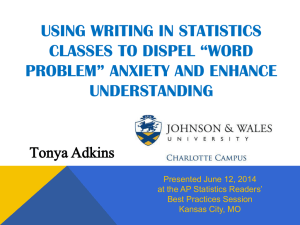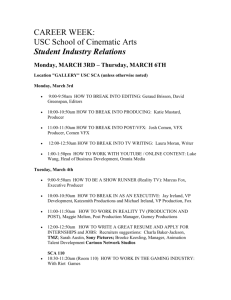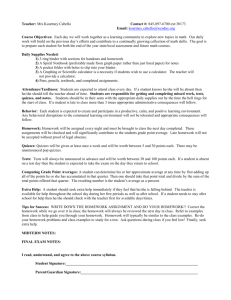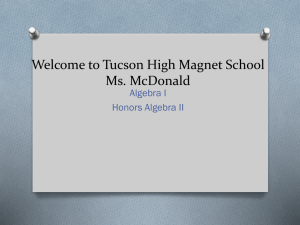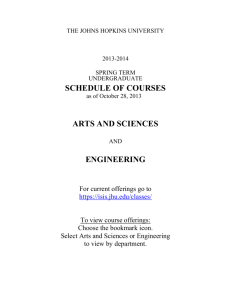Fall 2010 Syllabi
advertisement
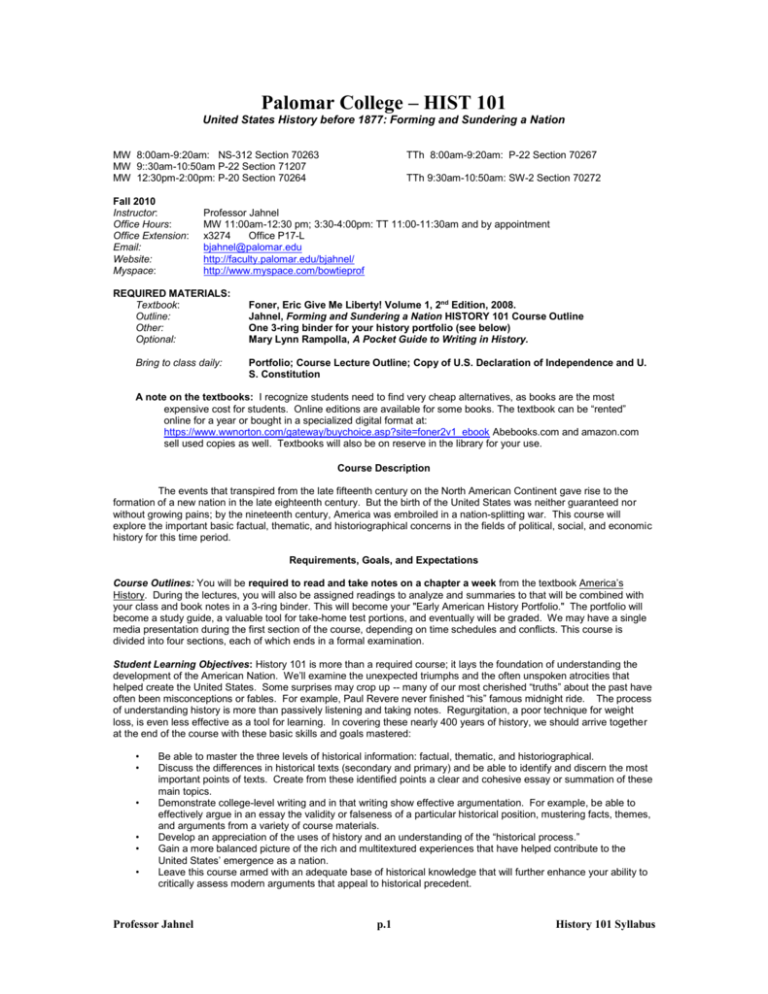
Palomar College – HIST 101 United States History before 1877: Forming and Sundering a Nation MW 8:00am-9:20am: NS-312 Section 70263 MW 9::30am-10:50am P-22 Section 71207 MW 12:30pm-2:00pm: P-20 Section 70264 Fall 2010 Instructor: Office Hours: Office Extension: Email: Website: Myspace: TTh 8:00am-9:20am: P-22 Section 70267 TTh 9:30am-10:50am: SW-2 Section 70272 Professor Jahnel MW 11:00am-12:30 pm; 3:30-4:00pm: TT 11:00-11:30am and by appointment x3274 Office P17-L bjahnel@palomar.edu http://faculty.palomar.edu/bjahnel/ http://www.myspace.com/bowtieprof REQUIRED MATERIALS: Textbook: Outline: Other: Optional: Bring to class daily: Foner, Eric Give Me Liberty! Volume 1, 2nd Edition, 2008. Jahnel, Forming and Sundering a Nation HISTORY 101 Course Outline One 3-ring binder for your history portfolio (see below) Mary Lynn Rampolla, A Pocket Guide to Writing in History. Portfolio; Course Lecture Outline; Copy of U.S. Declaration of Independence and U. S. Constitution A note on the textbooks: I recognize students need to find very cheap alternatives, as books are the most expensive cost for students. Online editions are available for some books. The textbook can be “rented” online for a year or bought in a specialized digital format at: https://www.wwnorton.com/gateway/buychoice.asp?site=foner2v1_ebook Abebooks.com and amazon.com sell used copies as well. Textbooks will also be on reserve in the library for your use. Course Description The events that transpired from the late fifteenth century on the North American Continent gave rise to the formation of a new nation in the late eighteenth century. But the birth of the United States was neither guaranteed nor without growing pains; by the nineteenth century, America was embroiled in a nation-splitting war. This course will explore the important basic factual, thematic, and historiographical concerns in the fields of political, social, and economic history for this time period. Requirements, Goals, and Expectations Course Outlines: You will be required to read and take notes on a chapter a week from the textbook America’s History. During the lectures, you will also be assigned readings to analyze and summaries to that will be combined with your class and book notes in a 3-ring binder. This will become your "Early American History Portfolio." The portfolio will become a study guide, a valuable tool for take-home test portions, and eventually will be graded. We may have a single media presentation during the first section of the course, depending on time schedules and conflicts. This course is divided into four sections, each of which ends in a formal examination. Student Learning Objectives: History 101 is more than a required course; it lays the foundation of understanding the development of the American Nation. We’ll examine the unexpected triumphs and the often unspoken atrocities that helped create the United States. Some surprises may crop up -- many of our most cherished “truths” about the past have often been misconceptions or fables. For example, Paul Revere never finished “his” famous midnight ride. The process of understanding history is more than passively listening and taking notes. Regurgitation, a poor technique for weight loss, is even less effective as a tool for learning. In covering these nearly 400 years of history, we should arrive together at the end of the course with these basic skills and goals mastered: • • • • • • Be able to master the three levels of historical information: factual, thematic, and historiographical. Discuss the differences in historical texts (secondary and primary) and be able to identify and discern the most important points of texts. Create from these identified points a clear and cohesive essay or summation of these main topics. Demonstrate college-level writing and in that writing show effective argumentation. For example, be able to effectively argue in an essay the validity or falseness of a particular historical position, mustering facts, themes, and arguments from a variety of course materials. Develop an appreciation of the uses of history and an understanding of the “historical process.” Gain a more balanced picture of the rich and multitextured experiences that have helped contribute to the United States’ emergence as a nation. Leave this course armed with an adequate base of historical knowledge that will further enhance your ability to critically assess modern arguments that appeal to historical precedent. Professor Jahnel p.1 History 101 Syllabus • Understand the nature of what it means for something to be an “historical fact” and the importance of peer review versus simplistic opinion or supposition. Evaluations: The big question: How will I be graded? (I know it is more “correct” to state that the most important part of the course is the process of learning. This is true. But all teachers have been students at one time; I KNOW it was always my biggest short-term concern. The benefit of long-term knowledge I always seemed to appreciate much more after the final exam was turned in.) Exams: There will be three major exams and a special final, the BHFE. The three major exams are noncumulative and will often consist of an in-class evaluation of recall and evaluation involving major people, events, trends, themes, and historiography. You will often be called upon to identify the person, place, or event, and then briefly explain the reason for its historical significance. You may be assigned part of all of a test as a take-home essay. For the takehome portions of the test, you will be able to use your notes, books, and other written study materials to help create your argument or theme. The tests that contain take-home essays will have fewer questions on the in-class section than any test that contains only the in-class segment. The three tests will be worth 15% of your grade each. The fourth test, known as the BHFE, is your final exam and will be a comprehensive take-home essay examination worth 30% of your grade. I may instruct you on take-home assignments to turn in portions of your work through our online course system called Blackboard, which you access with your student login information from the web address: http://www.palomar.edu/blackboard/ BHFE FINAL: Your take home final exam will be due on the date noted in the calendar section below. Classes will still meet on final exam hours for a special activity and failure to attend will count double (four hours) against your attendance schedule. No Late finals will be accepted. History Portfolio: You will be responsible for maintaining a 3-ring binder in which you will keep class notes and summaries of articles and chapters from your textbook. These portfolios will be worth 25% of your grade, and should prove to be a relatively easy grade to do well on, since what you have to do for free in most classes (take notes) you will receive credit for within this class. I will announce a week before I request reviews of your portfolios, so that you may have time to organize them and prepare them for grading. The first turn in for portfolios will be between the first and second examinations and cover book chapters 1-8, class notes on sections 1 and 2 of the outline, and any short dorky papers (SDPs) I have assigned in the meantime. Quizzes: There WILL be occasional quizzes in History 101. These will not be announced. However, being astute mathematicians as well as historians, you probably have noted that if the exams are worth 75% (15+15+15+30)% of your grade and the portfolio is worth the other 25%, then all 100% of your final grade should already have been accounted for. The pop quizzes are instead a chance to not only help you gauge your progress and mastery of the course, but can also help add a point to an examination or essay. These pop quizzes constitute the only form of “extra credit” in the course. There is no make-up available on quizzes -- if you miss the class when the quiz is held, you will be unable to reap the benefit of possible extra points for something you might stumble over during a test or essay. I do reserve the right to give a single quiz that can count toward your final grade. Research Paper: You luck out this time -- no research paper! It is assumed that all students will take exams at the proscribed times, unless other arrangements are made to the contrary. I have two versions of each exam -- the “fair” and the “rough but still fair.” The fair exam is the one that will be given on the scheduled date. Since during a makeup it would be unfair to your fellow students to have you take the same exam, it leaves me only with my rougher exam to administer should you miss the scheduled examination. Therefore, it is to your benefit to take the exam when it is scheduled. Should an extraordinary circumstance occur which forces you to miss an exam, the make-up must be scheduled at the earliest possible date. See also rules on LATE WORK, below. Late Work: I have simple policies about everything, late work included. You may turn in late work, but it will always be graded LAST, after every other assignment from every other class is graded. This means that early in the semester you have an excellent chance of getting your work evaluated even if a day late. However, nearer the end of the semester, I may run out of time and late work may receive no grade at all. I always reserve the right to lower the grade of work turned in late. FINAL GRADE: Each piece of work will be evaluated on the standard 100-point academic scale and then weighted according to the percentages described above. Pop quizzes may add points to essays or tests, as determined by your instructor, but in no case will any form of extra credit add more than three (3) points to your final grade. Nonetheless, those three points can mean the difference in a letter grade! Academic Dishonesty: The rules of academic dishonesty are clear and the penalties far outweigh the minor benefits you may receive. You may not look at another person’s test; solicit aid outside of your own written or reading materials for take-home exams or essays; use crib notes, secret computer codes, reappearing ink on test pages, or 2-way receivers during tests; or generally employ any other mundane or extraordinary ways to circumvent doing your own work in class. Any person found cheating will receive an automatic ZERO and will be referred to the appropriate channels at Palomar College for possible further disciplinary action or expulsion. Attendance: Attendance will be kept at every class meeting. In a course such as this, which relies heavily upon the interaction between lectures and readings, it is crucial that you attend class. It is even rumoured the instructor tends to give pop quizzes on days of low attendance. Strong, clear note-taking ability is a skill necessary to do well in this course. You may also bring a tape recorder to class in order to help you with your notes. If during the course of the semester a student misses more than FIVE HOURS of instruction, then the student’s further work in the class will no longer be Professor Jahnel p.2 History 101 Syllabus graded. Failure to take the responsibility to drop a course by the drop deadline will result in an “F” on your report card for this course. Waiting Lists and Class Enrollment: Only students who are actually enrolled in History 101 will be graded. Students on waiting lists are NOT CONSIDERED ENROLLED and must be added manually by obtaining an add number from the instructor. I will collect the name of all students who are on the waiting lists and those who desire last-minute entry into the course. If an opening occurs I will notify students by the second week of class they may join the class. ANY STUDENT WHO RECIEVES A NUMBER TO ALLOW THEM TO ADD THE COURSE MUST DO SO BY THE DATE ON THE CALENDAR BELOW OR THEY LOSE THE OPPORTUNITY TO ENROLL IN THE COURSE. Class Procedures: All Professors have their quirks; perhaps I am quirkier than most. I have some very specific rules about classroom decorum that involves cellular phones and the wearing of hats in class. These are outlined on the first day and you are expected to follow these and any other appropriate guidelines of classroom decorum as instructed. Final Notes: We are all here to learn. That includes your instructor. In this exploration of such an extraordinary time, we may all find some of our perceptions challenged and questions which spur discussion or debate can lead to new historical understandings on both sides of the academic fence. My job as your instructor is to be your guide through the vast mazes of information pertaining to this time period. Your job as fellow scholars is to embark on this journey with the proper tools, an open and inquisitive mind, and a willingness to discipline yourself to the more mundane steps that will enable you to excel. I am always available during my office hours in the history department, or can arrange an appointment by telephone or departmental mail for other conferences. Do not hesitate to consult with me if you are having a difficulty with the material or an assignment; since my expectations for you are high, there is no reason your expectations of me should be any less. Together, we shall explore, gain a new understanding of the material in the course, and most of all, enjoy the learning process! Okay, last final note: The items on the schedule or in the syllabus are open to some flexibility. It may be due to time constraints or other factors that some topics may have to be lectured on a different date, or if the class has put a particularly strong effort into a particular essay I reserve the right to alter some of the weight of the grades. In all cases you will be notified well in advance of any changes in the course content or policies. Calendar Information Class Begins: Late ADD Deadline: Holiday- No Class: Holiday- No Class: Holiday- No Class: BHFE DUE: FINAL EXAM: Monday. August 23 August 30 (Only with permission of Prof. Jahnel) Monday. September 6 Friday. November 12 Thursday November 25 & Friday. November 26 Monday, Dec. 6 (MW) or Tuesday, Dec. 7 (TTH) You must still attend your final examination time schedule, listed below. You attend only the single class listed below on the week of the 13th – 17th. Please Note that classes in BOLD with an * note classes that meet AT A DIFFERENT TIME THAN USUAL! CLASS NORMALLY MEETS AT:: MEETS FINALS WEEK FROM: MW 8:00am-9:20am: NS-312 *MW 9:30am-10:50am: SW-2 * MW 12:30pm-2:00pm: P-20 TTh 8:00am-9:20am: P-22 * TTh 9:30am-10:50am: SW-2 Monday Dec 13 8:00am-9:50am Wednesday, Dec 15 10:00am-11:50am Wednesday Dec 15 Noon-1:50pm Thursday Dec. 16 8:00am-9:50am Tuesday Dec. 14 8:00am-9:50am Professor Jahnel p.3 History 101 Syllabus Your Historical Autobiography The first way we encounter history is to engage in discussing our own history. As I am interested in you as a person, our first class assignment will be to write a brief personal biography to be turned in next class. What must be on it: Your name: First and Last name as it appears on the roll sheet, and any nickname you like, prefer, or wish you had in (parentheses). A Description of yourself: A short physical description of yourself (so I can match names to faces): Feel free to be creative! You can doodle a self-portrait, or for the computer inclined, if you desire you may attach a real photo. More importantly, who are you? Where are you life? What goals have you set for yourself, what are your personal interests? What interests do you have that you might enjoy learning about in this course? Do you like wars? Fashion? Interested in religious history, business, technology, ethnic studies, gay and lesbian history, economic history, or the history of sports? Let me know… we have more information than time to cover it, so we have to exclude some things. Letting me know what interests YOU will help shape the lectures. Finally, make sure to place the commitment as discussed in class on your upper right hand corner of your biography. Professor Jahnel p.4 History 101 Syllabus
